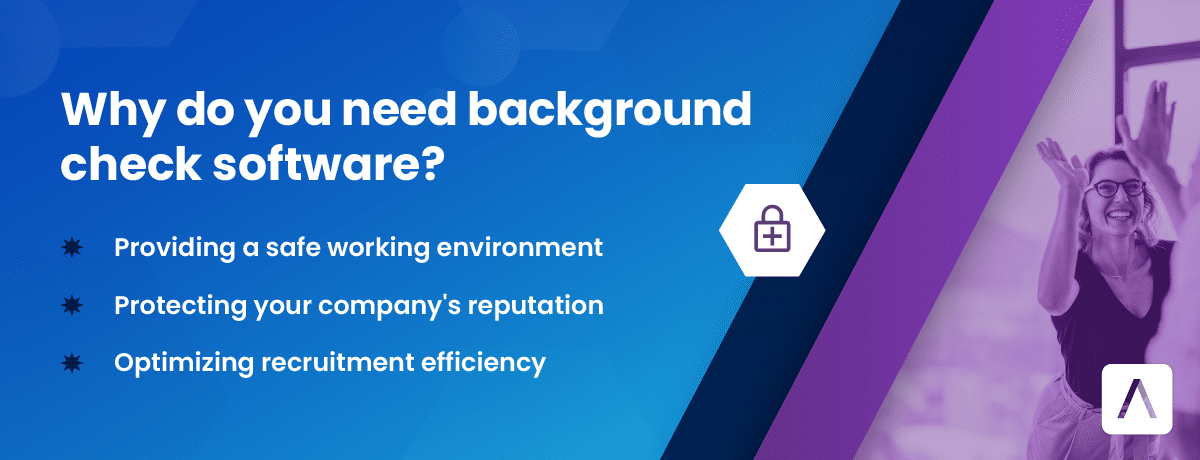The Cost of a Bad Background Screening Process
Are you familiar with the saying, “What you don’t know can’t hurt you”? When it comes to background screening during hiring, that couldn’t be further from the truth.
In fact, what you don’t know about your potential employees could end up costing your business dearly. From missed red flags to poor hires, a bad background screening process is bad for business.
Understanding the Background Screening Process: Explained
On the surface, we all know what background screening is. However, few organizations and HR professionals understand it.
It’s Not Like TV
You’ve seen the dramatic portrayals of background screenings revealing shocking secrets. In reality, background screening is not as glamorous or fast-paced. It’s a meticulous process that requires time and attention to detail.
Unlike on TV, conducting a thorough background check can take several days or weeks. It involves gathering information from different sources, including:
- Criminal records
- Employment history
- Education
- References
This might make it challenging to plan your hiring!
In Mitratech’s background screening software, you can see an average turnaround time. Whether you’re running a full screen or just a simple DOT screening – see how long it will take. This helps you hire faster and make smarter decisions.
While television exaggerates the process, real-life situations need careful attention. Don’t cut down on your screening to save time! Always opt toward meeting professional standards.
What Employers Look at
When it comes to background screening, employers have a keen eye for details. They want to ensure that they make informed decisions when hiring new employees. So, what exactly do employers look at during the background screening process?
First, employers verify an applicant’s identity. This includes checking a Social Security number, driver’s license information, and more. Employers need to confirm that the person applying for the job is who they claim to be.
Employers also take a close look at an applicant’s employment history. They want to know if the candidate has been truthful about their past. This includes positions, responsibilities, and dates of employment. Any discrepancies or gaps in work history can raise red flags.
Another crucial aspect of background screening is conducting criminal record checks. Employers must ensure new hires don’t have serious criminal convictions that pose risks. That risk could be to the safety of the employees or the company’s reputation.
Additionally, many employers consider credit reports as part of their background screening process. This practice varies depending on the industry and position. However, some companies believe an individual’s finances reflect their character and reliability.
Employers may check an applicant’s educational credentials or degrees from college. This helps them determine if candidates have the qualifications they claim to have.
For a full explainer of what background screening can do, refer to our blog here.

Consequences of Ignoring Background Screening
When hiring new employees, employers underestimate the importance of conducting thorough background screenings. Ignoring this crucial step in the hiring process can have severe consequences.
Neglecting background screening can expose your organization to potential legal issues.
Hiring individuals without properly vetting their backgrounds could result in liability if they engage in illegal activities or pose a risk to others while on the job. This negligence could lead to lawsuits, damage to your company’s reputation, and financial losses that could have been avoided.
Failing to conduct proper background checks can put your current employees at risk. By not assessing an applicant’s criminal history, you may hire someone who is a thief or has a violent past. This puts your team members’ safety and well-being in jeopardy.
Additionally, ignoring background screening allows unqualified candidates to slip through the cracks. You must verify credentials, employment, and licenses to avoid hiring someone lacking skills. This can hinder productivity and impact business performance.
Moreover, skipping background checks can also harm workplace morale and employee trust. If your workers discover that new hires were not screened, it sends a message that you do not value their safety. This erosion of trust can negatively impact employee engagement and loyalty.
Why Background Screening is Essential
When hiring new employees, businesses can’t afford to take chances. That’s where background screening comes in. By conducting comprehensive background checks, employers gain insights into an individual’s past. They also help them make more informed decisions.
Background screening involves:
- Verifying a candidate’s personal information.
- Checking their employment history.
- Confirming their educational qualifications.
- Even delving into their criminal records if necessary.
It provides a holistic view of an applicant that goes beyond a resume or interview.
There are several benefits to implementing a robust background screening process. It helps mitigate the risk of hiring individuals who may threaten the safety of others. By identifying any red flags early on, employers can avoid detrimental situations.
Background screening enables companies to protect their reputation and brand image. Hiring someone with a questionable past may hurt credibility and trustworthiness.
Furthermore, conducting thorough background checks ensures compliance with industry regulations and standards. Some industries require employee screenings due to legal obligations or security concerns. Failing to adhere to these guidelines could result in fines or legal repercussions.
So what can you do? Investing in modern solutions for background checks saves time and resources for companies. Automated systems have faster turnaround times while maintaining accuracy and consistency.
Customizable background screening solutions mean all businesses can get this tool. Whether you’re a small startup or an established corporation, there’s a package for you.

Benefits of a Formal Background Screening Process
A comprehensive background screening process offers many benefits to employers. Companies can make more informed hiring decisions and protect themselves by conducting checks.
Here are some key advantages of implementing a robust background screening policy:
- Enhanced Safety and Security. Background screenings for violence, criminal activity, or substance abuse keep your workplace safe. Some environments allow workers who have those backgrounds. That’s necessary, but some workplaces cannot have it. Create a safer environment and reduce the risk of things like theft or harassment.
- Protecting Company Reputation. Hiring an employee with a questionable background can damage your company’s reputation. Conducting background checks allows you to hire individuals aligned with your company values.
- Decreased Employee Turnover. Effective background screening processes can lead to better candidate selection and reduce turnover. Employers can avoid making costly hiring mistakes by identifying red flags early on.
- Compliance with Industry Regulations. Various industries have specific regulations about employee qualifications and safety standards. Background screenings ensure compliance with these regulations while avoiding legal issues and penalties.
- Improved Quality of Hires. Hiring candidates with verified credentials, relevant experience, and clean backgrounds is important! It increases the likelihood of finding qualified professionals that help your organization succeed.
Reducing Risks: An Association of Certified Fraud Examiners (ACFE) study found that companies with proper background screening programs experienced 28% fewer occupational fraud and abuse instances.
The Consequences of a Bad Background Screening Process
The consequences of neglecting background screening can be severe and far-reaching. Without proper screening, employers are open to a wide range of risks.
By not conducting background checks, employers may hire individuals with criminal records. This can lead to financial loss, reputational damage, and legal liabilities.
Neglecting background screening can result in poor hiring decisions. Hiring someone without verifying qualifications or history can lead to mismatched skill sets. This wastes time and resources and affects productivity and employee morale.
Additionally, failing to screen candidates can create a negative workplace environment. Employees may feel unsafe working alongside individuals with undisclosed criminal pasts. This can impact teamwork and trust among colleagues, affecting your organization’s culture.
Neglecting background screening also opens up possibilities for theft or fraud.
Skipping background screening is risky and can have significant consequences for an organization. Employers must prioritize screenings to minimize risks and make informed decisions.
The High Cost of Making Bad Hiring Decisions
When hiring new employees, making the wrong choice can seriously affect your business. From a financial perspective, the cost of a bad hire can be astronomical. Not only will you waste time and resources on someone who isn’t a good fit, but you’ll also repeat the hiring process.
But it’s not just about money. A bad hire can also damage your company’s reputation and morale. If an employee turns out to be unreliable, it impacts team dynamics and productivity.
Furthermore, there may be legal problems if you fail to conduct background screening. This could result in lawsuits or even fines imposed by regulatory bodies.
Additionally, consider the potential damage if sensitive information falls into the wrong hands. The fallout from data breaches or intellectual property theft can be devastating. It impacts both financially and in terms of trust with your customers.
Failing to focus on background screening when hiring is not worth the risk. Investing in thorough screening processes upfront will save you from potential headaches. It also ensures you have qualified, trustworthy, and aligned candidates.
How to Establish a Reliable Background Screening Process
Establishing a reliable background screening process is crucial. A normal screening process works, but it has to be repeatable. Here are some best practices to follow when implementing this process.
It’s essential to conduct a thorough employment background check. This involves verifying an applicant’s identity, checking credit reports, and reviewing records. By gathering this information, employers can determine whether candidates are honest.
Determining the scope and duration of background checks is also essential. Different positions need different levels of scrutiny based on the nature of the job. For example, roles with sensitive information or vulnerable populations need different screenings.
To ensure consistency and accuracy, partner with a background check service provider. Mitratech offers comprehensive solutions tailored to businesses of all sizes. This allows you to customize your screening criteria according to your specific needs.
Integrating your background screening process into your Applicant Tracking System (ATS) or Human Resources Information System (HRIS) can improve efficiency. It does so by automating certain tasks and streamlining workflows.
Organizations must establish a reliable screening process. With these best practices and using a solution like Mitratech, it’s possible.
Background Check FAQs
1. What is a background check?
A background check is a process used to verify a person’s identity and review their past record. You check databases for criminal, employment, education, or financial history.
2. Why should I conduct background checks on my employees?
Background checks ensure a safe work environment, protect your company’s reputation, and mitigate potential risks by verifying candidate information.
3. What information is included in a background check?
A typical background check includes:
-
Criminal history
-
Employment verification
-
Education verification
-
Credit history
-
Motor vehicle records
This is just a snapshot!
4. How long does a background check take to complete?
The time it takes to complete a background check can vary. It depends on the check’s depth and the sources’ responsiveness. It can take anywhere from a few days to a couple of weeks.
5. Is background screening legal?
Yes, background screening is legal.
6. What happens if a candidate’s background check reveals negative information?
If negative information is found, the candidate should be able to explain or dispute the findings. This should be done before any adverse action is taken.
7. Can individuals request a copy of their own background check report?
Yes, individuals have the right to request a copy of their background check report under the FCRA. They can review the report and address any inaccuracies or discrepancies.
8. How often should background checks be conducted on current employees? I
It is recommended to conduct periodic background checks on current employees. This is especially true for those in sensitive positions to ensure ongoing compliance.
9. What sets Mitratech’s background screening services apart in the industry?
We offer comprehensive background screening solutions tailored to your needs! We ironclad your screening with cutting-edge technology, industry expertise, and a commitment to accuracy.
10. How can I get started with background screening services? Getting started with background screening services is easy!
Reach out to our team, discuss your requirements, and we’ll guide you through the process.
Our focus? On your success.
Schedule a demo, or learn more about Mitratech’s products, services, and commitment.




